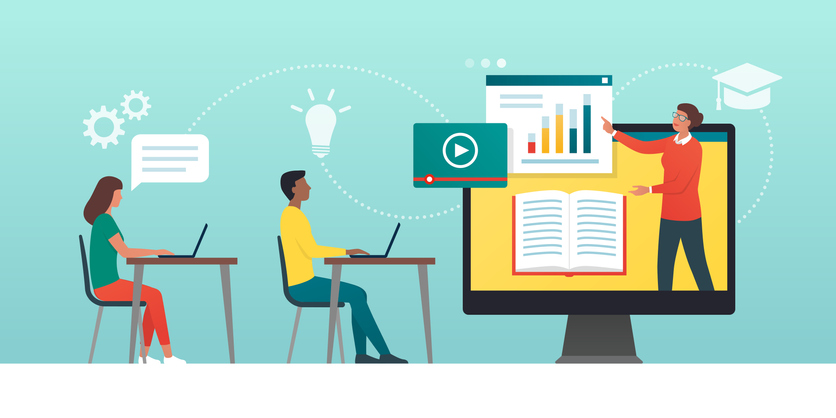When you think of your educational journey, your experience in an institutionalized setting will likely immediately come to mind. From early learning to middle school, then high school, and — for many — college or post-graduate training, we are primarily familiar with education through the classroom. However, when that portion of your journey ends, a new one begins — the pursuit of lifelong learning. While we garner much from a classroom, that is only one piece of the learning pie. The remainder of the pie combines what we do outside of the classroom. That, in many ways, is where curiosity and a thirst for knowledge come into play.
Formal education is a clearly defined journey. For most, by your mid-20s you will have exhausted your institutionalized ride. At that point, many of us believe we’re done. We’ve finished our education and then move on with the business of life. Without the structure or possibly the discipline of a formal education environment, some of us simply stop. Is there a lesson plan for life? Where does humanity go to school?
Throughout the evolution of humanity, the Renaissance (roughly from the 14th to the 16th century) is recognized as a period driven by cultural, artistic, political and economic rebirth after the Middle Ages. Traditional education did not fuel this period of intellectual reawakening and rapid advancement for humanity. The modern classroom didn’t exist, and most of the great minds of the era were self-taught, driven by intellectual curiosity and a lifelong passion for learning.
It is not just knowledge but a passion for and competence in a few fields that makes one more talented, productive and interesting. The concept of the Renaissance man comes from a reference to the most gifted artists, scientists and thinkers who lived during that period. Sometimes, the Renaissance man is considered a polymath, one who has deep knowledge about various subjects.
Leonardo da Vinci became the prototypical Renaissance man through his drive for intellectual curiosity. Self-taught in the arts and sciences, da Vinci was a painter, an architect, a mathematician and a scientist, interested in learning anything about the universe, including our place in it. Within his notebooks, we see evidence of this curiosity. How do birds fly? Why is the sky blue? Why do people yawn? This curiosity drove his science, his math and his art.
A Renaissance person never stops learning. They rarely become complacent, accepting the status quo. Think of the most interesting person you know. There is one common denominator. That person, driven by intellectual curiosity, likely knows a place, a people, a skill or a topic that you find intriguing. Intellectual curiosity drives some people to outstanding achievements while leaving others, remote in hand, to be entertained. Is it a thirst for knowledge, a curious mind or the emotion of discovery that drives us?
The impact of lifelong learning on society
Opportunities to learn, expand our horizons and take on new and curious experiences surround us. Each outlet ranges from music to art to literature to social media, giving us a tremendous outlet to pursue knowledge. Yes, even social media provides a vehicle to learn. But social media is often a mindless journey. How many hours do we burn by scrolling through page after page of personal updates or videos carefully curated by an AI algorithm to keep our attention or direct us to other mindless forms of entertainment?
This mindless entertainment is no different from the forms of distraction that we’ve had for generations. Paging through magazines, watching hour after hour of television shows or listening to music as background noise are all examples of entertainment activities that do little to enrich our lives. If we take the same basic mediums and simply apply a different approach, we can turn mindless entertainment into mindful learning.
Next time you’re scrolling through 150 channels for television entertainment, consider a documentary that will entertain and teach. Instead of a romance novel that may provide mindless relaxation on a flight, consider a literary classic or perhaps a historical novel. Even social media can have redeeming value when mindless scrolling is replaced with a targeted search to find specific topics that provide an opportunity for mindful learning. It is all possible and often at our fingertips. Lifelong learning is everywhere; the only obstacle is our willingness to find and partake in it. But maybe the most important point of this chapter is that we all benefit from collective learning.
Helping our students get the right education from the beginning and then fostering a culture of lifelong learning is the best antidote to the challenges that humanity faces. As Gandhi said, “Live as if you were to die tomorrow. Learn as if you were to live forever.” Knowledge will ultimately affect every aspect of our lives, from the politicians who govern to the police officers who protect. The more they know, the more effective they can be. The more knowledge can shine a light on uncertainty, eliminate fear, and take away our doubts, the safer we will be and the more freedom we will have. Education is, indeed, our freedom.
Excerpted from: Education is Freedom by James W. Keyes, published by Davio Republic, © 2024 by James Keyes. Reprinted courtesy of Davio Republic.
Opinions expressed by SmartBrief contributors are their own.
____________________________________
Take advantage of SmartBrief’s FREE email newsletters on leadership and business transformation, among the company’s more than 250 industry-focused newsletters.
